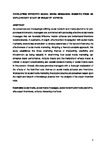Developing effective social media messages: Insights from an exploratory study of industry experts
| dc.contributor.author | Megicks, Philip | |
| dc.contributor.author | Majid, S | |
| dc.contributor.author | Lopez Lamelas, C | |
| dc.contributor.author | Lim, WM | |
| dc.date.accessioned | 2019-02-17T12:55:43Z | |
| dc.date.issued | 2019-02-13 | |
| dc.identifier.issn | 0742-6046 | |
| dc.identifier.issn | 1520-6793 | |
| dc.identifier.uri | http://hdl.handle.net/10026.1/13310 | |
| dc.description.abstract |
As consumers are increasingly utilizing the social network and media platforms for prepurchase information, managers are confronted with producing effective social media messages that can favorably influence buyers’ attitudes and behavioral intentions towards brands. A qualitative, in‐depth, elite interview investigation with social media marketing experts was undertaken to develop awareness of the factors influencing the effectiveness of social media marketing. Adopting a thematic analysis approach, this study establishes the three overriding themes of interactivity, credibility, and infotainment as being valuable in determining how social media marketing can enhance brand performance. Attitude theory and the hierarchy‐of‐effects model is utilized to support understanding and explain the decision making of social media users in this context. Overall, this study provides managers with a thorough explanation of the effects of the identified core themes on social media attitudes and intentions. Implications for social media marketing theory and practice are presented based upon the depth and breadth of knowledge attained from the analysis of the expert interview data. | |
| dc.format.extent | 551-564 | |
| dc.language | en | |
| dc.language.iso | en | |
| dc.publisher | Wiley | |
| dc.subject | Elite expert interviews | |
| dc.subject | Hierarchy‐of‐effects | |
| dc.subject | Social Media | |
| dc.subject | Social network and media platforms | |
| dc.subject | Attitude | |
| dc.title | Developing effective social media messages: Insights from an exploratory study of industry experts | |
| dc.type | journal-article | |
| dc.type | Journal Article | |
| plymouth.author-url | https://www.webofscience.com/api/gateway?GWVersion=2&SrcApp=PARTNER_APP&SrcAuth=LinksAMR&KeyUT=WOS:000465944900001&DestLinkType=FullRecord&DestApp=ALL_WOS&UsrCustomerID=11bb513d99f797142bcfeffcc58ea008 | |
| plymouth.issue | 6 | |
| plymouth.volume | 36 | |
| plymouth.publication-status | Published | |
| plymouth.journal | Psychology and Marketing | |
| dc.identifier.doi | 10.1002/mar.21196 | |
| plymouth.organisational-group | /Plymouth | |
| plymouth.organisational-group | /Plymouth/Faculty of Arts, Humanities and Business | |
| plymouth.organisational-group | /Plymouth/Faculty of Arts, Humanities and Business/Plymouth Business School | |
| plymouth.organisational-group | /Plymouth/PS - Academic Partnerships | |
| plymouth.organisational-group | /Plymouth/REF 2021 Researchers by UoA | |
| plymouth.organisational-group | /Plymouth/REF 2021 Researchers by UoA/UoA17 Business and Management Studies | |
| plymouth.organisational-group | /Plymouth/Users by role | |
| plymouth.organisational-group | /Plymouth/Users by role/Academics | |
| dcterms.dateAccepted | 2019-01-22 | |
| dc.rights.embargodate | 2021-2-12 | |
| dc.identifier.eissn | 1520-6793 | |
| dc.rights.embargoperiod | Not known | |
| rioxxterms.versionofrecord | 10.1002/mar.21196 | |
| rioxxterms.licenseref.uri | http://www.rioxx.net/licenses/all-rights-reserved | |
| rioxxterms.licenseref.startdate | 2019-02-13 | |
| rioxxterms.type | Journal Article/Review |


